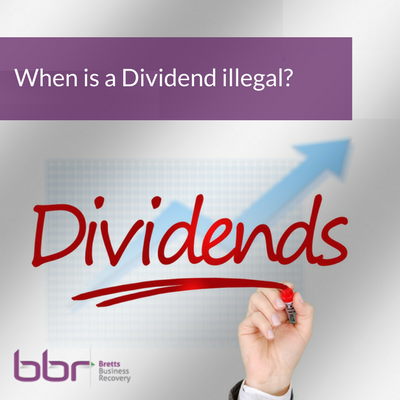When is a Dividend illegal?

If you pay dividends out of your company when insufficient profit/distributable reserves exist, and/or the requirements of the Companies Act 2006 are not met, such dividends are deemed as unlawful/illegal/ultra-vires. Therefore, dividend payments can sometimes be daunting for the director, who is also the shareholder (“owner manager”) of the company, in both pre and post insolvency periods.
As per the current tax regime, the dividend tax rate is less than the income tax rate and dividends will not attract any national insurance contributions. To take advantage of this the company accountant will often advise the owner manager to draw less income through PAYE (in most cases, it is limited up to the annual personal allowance) and more through dividends, which is the usual tax efficient way of doing things.
A person is presently entitled to receive tax free dividends up to £5,000.00 this year (this will reduce to £2,000 in 2018/19). Also, as announced by the chancellor in the recent budget, the personal tax allowance for an individual in 2018/2019 will be £11,850.00 (currently £11,500.00). In other words, the owner manager shall receive tax free income of approximately £16,500.00 this year and £13,850 for the next year, out of his private company. However, simply drawing money out of the company as dividends (even the tax-free dividend) will hook you unknowingly into complications if the parameters set by the Companies Act 2006 are not followed.
Under the provisions of Section 830 of the Companies Act 2006, a company shall only make a dividend out of the distributable profits/reserves and you are unable to declare more than what is available as the distributable reserve. Your company may have a healthy bank balance, but the company may not have generated sufficient profit to take such bank balances as your dividend. Therefore, if there is no profit after tax, you are unable to declare a dividend. Also, you need to bear in mind that before you declare a dividend you should hold a board meeting and keep the minutes of the same. You should prepare relevant financial statements to justify the amount declared as dividend. The accounts, which need not be filed for a private company, will assist the directors to make reasonable judgement as to the company’s profits and losses, assets and liabilities, share capital and reserves. You also need to issue the dividend notes/vouchers to the individual shareholders.
The dividend payment need not be in cash form but may be in other forms such as a transfer of an asset or the writing off a book debt or distribution in specie. Under the provisions of the Company’s Act 2006 as amended, if an individual knows or believes that an unlawful dividend was paid to him/her, he/she shall be liable to repay such sums together with interest to the company. This is applicable in both pre-and post-insolvency period and there is little that owner managers can do to protect themselves after the event.
In a pre-insolvency period, if an individual is found to have been paid unlawful dividend, they may end up paying Income Tax and NIC as HM Revenue and Customs (“HMRC”) will reclassify such payments, in full or in part as salary and/or allocate it to directors’ loan Account. If it is allocated to an overdrawn loan account then the company needs to pay corporation tax under Section 455 of the Corporation Tax Act 2010 and the director has to pay a charge for the benefit in kind (BIK) received from the company.
Unlawful dividends in the post-insolvency period creates more complications for the directors when such payments are challenged as a transaction at an undervalue or as a preference by the appointed officeholder. If you haven’t prepared the relevant documents at the time of the declaration of the dividend, it would be better if you do not backdate relevant documents as it could be potentially classified as a criminal act to falsify the company’s records. The directors has a duty to stop an unlawful dividend being made. Failure to do so may result in civil recovery against the directors. Some case law indicates that the directors who have authorised unlawful dividend payments become personally liable for such distribution.
Watch this space for my next article on “winding up petition”
Regards, Riji
Need Help?
If your clients are owner managers and you have concern regarding a potential illegal dividend please call us for free and confidential advice from one of our professional advisers on 01474532862 or email to isobelbrett@brettsbr.co.uk or rijimon@brettsbr.co.uk. We may be able to limit your personal risks and liabilities.